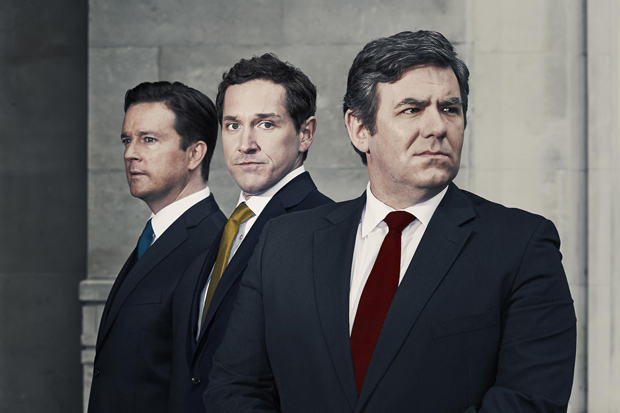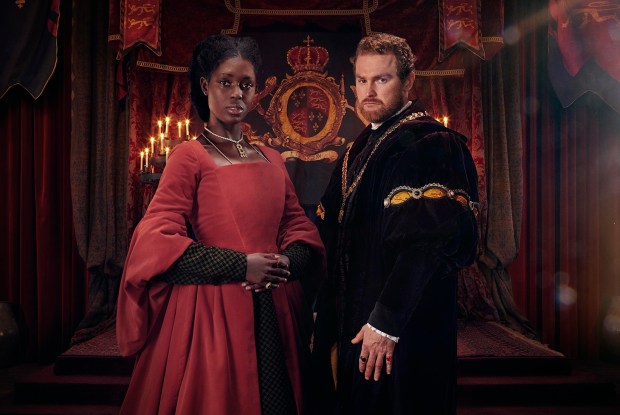In a late schedule change, Channel 4’s Coalition was shifted from Thursday to Saturday to make room for Jeremy Paxman interviewing the party leaders. With most dramas, that would mean I’d have to issue the sternest of spoiler alerts for anybody reading before the programme goes out. In this case, though, you know the story already — because Coalition was a dramatisation of what happened in Westminster in the days after the last general election.
Fortunately, one of the programme’s many qualities was its Day of the Jackal ability to keep us gripped even though we were always aware of the outcome — largely by reminding us that the characters weren’t. Another was how often it brought to mind Alan Bennett’s observation that ‘there is no period so remote as the recent past’. ‘Clegg nearly as popular as Churchill,’ read a Sunday Times headline after the first TV debate. ‘Mr Schwarzenegger!’ cried David Cameron, taking a call from the governor of California — on a phone handed to him by Andy Coulson.
But most surprising (and bravest) of all, Coalition was almost heroically free of cynicism. Three years ago, its writer, James Graham, managed to have a huge stage hit with This House, a serious-minded exploration of the fall of the Labour government in 1979. Here, he demonstrated a similar willingness to acknowledge political complexities — but also a touching degree of respect, and even sympathy, for the politicians caught up in them. While clearly no strangers to self-interest, all three party leaders were presented as men genuinely trying to carry out the electorate’s wishes, however unpalatable.
In the circumstances, the competition as to which of them was most agonised proved predictably fierce. ‘This isn’t going to plan,’ whispered a shellshocked David Cameron once the election results started coming in. Gordon Brown, apparently encouraged by not having done far worse, continued in tormented denial for a few days before being forced to abandon his dream of a united left ruling Britain for ever. Even so, the most agonised of the lot was probably Nick Clegg who, despite his supposedly triumphant campaign, finished up losing seats. ‘I feel so stupid, buying into all that hype,’ he lamented on election night. ‘I thought it was real.’ And that was before he found himself with the future of British politics in his unprepared hands….
Graham took us through the twists and turns of what followed with great clarity — but without ever allowing us to forget how twisty and turny they were. We did, mind you, have a couple of useful guides. The first, representing realpolitik, was Peter Mandelson — who, as played by Mark Gatiss, was even more camp and sinister than the man himself, but who deftly carried out the tricky task of persuading Brown that the game was up. The second was Paddy Ashdown, who in his role as the Lib Dems’s conscience came across like a combination of John of Gaunt and Obi-Wan Kenobi — neither of whom, admittedly, would be likely to conclude a game-changing speech with the words, ‘Fuck it, let’s do it.’
In his bid to cover all the issues, Graham did occasionally seem to be noting a few in passing, rather than integrating them. Nor, for all his assiduous research, did he turn up a great deal that was revelatory, although there was a firm suggestion that Cameron deliberately misled his own party by telling them Labour was unconditionally offering the Lib Dems voting reform — and a smiling confession from Mandelson that the ‘Lib Dems’ who’d protested against a coalition with the Tories were in fact Labour party workers sent by one P. Mandelson.
Nonetheless, this was a drama that, in its unfashionable way, not only took politics and politicians seriously, but appeared to like both — which ended up making it rather refreshing as well as unexpectedly convincing.
And still on the subject of respect: if the Mafia still executes people for not showing enough of it, then a certain veteran newsreader can sleep easy for a while yet. On Monday, in ITV’s The Mafia with Trevor McDonald (a title that could have come straight from Alan Partridge), Sir Trevor’s habitual courtesy went into overdrive as he warmly thanked a murderer in a mask ‘for giving us so much of your time’ — and hymned another mobster’s ‘brilliance at inventing sophisticated scams’.
Luckily, his endless politeness did pay off. For anyone who’s ever seen a film or TV show about the Mafia, this won’t have been a programme packed with revelations either. Nonetheless, there was something to be said for hearing the familiar stuff at first-hand, even if the central theme was sad decline. Asked about how to make it in the Mob, the masked murderer sorrowfully replied that, ‘Years ago, you had to kill someone. Today it’s more about if you’re a good earner.’
Got something to add? Join the discussion and comment below.
Get 10 issues for just $10
Subscribe to The Spectator Australia today for the next 10 magazine issues, plus full online access, for just $10.
You might disagree with half of it, but you’ll enjoy reading all of it. Try your first month for free, then just $2 a week for the remainder of your first year.














Comments
Don't miss out
Join the conversation with other Spectator Australia readers. Subscribe to leave a comment.
SUBSCRIBEAlready a subscriber? Log in